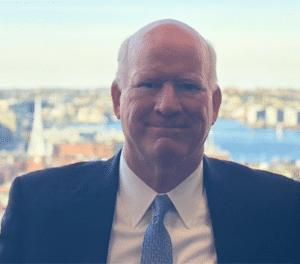George McLaughlin III
Attorney, The McLaughlin Brothers, P.C.
Age: 65
Industry experience: 41 years
Eminent domain disputes in Boston, Somerville and Nahant that have made headlines this year all have a common thread: Attorney George McLaughlin III represents the owners fighting government agencies’ takings of their properties. For three generations, Boston-based McLaughlin Brothers P.C. has represented thousands of property owners in legal disputes against federal, state and local entities.
The firm is fighting Gov. Maura Healey’s recent eminent domain seizure of St. Elizabeth’s Medical Center in Brighton, now being operated by Boston Medical Center following Steward Health Care’s bankruptcy. McLaughlin Brothers also represents Northeastern University in its attempt to expand a marine research center in Nahant and a Dorchester developer that disputed the city of Somerville’s price for acquisition of a former shopping center.
The three brothers were trial attorneys who were all elected to fellowship in the American College of Trial Lawyers. Walter H. McLaughlin served as chief justice of the Superior Court and George A. McLaughlin Sr. became dean of the Massachusetts eminent domain bar.
Q: The state Land Court is reviewing the legal challenge of the Healey administration’s seizure of St. Elizabeth’s Medical Center in Brighton, citing a public health emergency following the Steward Health Care bankruptcy. What is the next step?
A: The commonwealth took the property for approximately $4.5 million and it’s assessed for [$191 million]. We’re in the process of fighting the validity of that taking. That will be the biggest eminent domain trial ever tried in Massachusetts. We’re in the Land Court now fighting about the validity of the taking. If the courts uphold the validity, that will [lead to] a jury trial in Suffolk County. There are complicated statutes involved, and we are arguing there are various statutes that the commonwealth has not complied with.
Q: Has eminent domain always been the firm’s specialty?
A: My grandfather, who was George McLaughlin Sr., was a great trial lawyer and he focused on eminent domain cases. He put his two brothers through law school, including his brother Walter who became chief justice of the Superior Court in the 1970s. The civil courts got tired of writing “The Law Offices of George, Walter and Charles McLaughlin” so they shortened the name to The McLaughlin Brothers. My friends love asking me, “Is that a landscaping firm?” My father was a trial lawyer, and I’ve tried probably 160 jury trials. We’re tried a lot of different types of cases, but we really focus on eminent domain.
Q: What is the background of Northeastern University’s dispute with the town of Nahant?
A: It’s a very interesting case. In your typical taking, you do a taking under Chapter 79, and when the taking authority wants to take your property, they record an order of taking at the Registry of Deeds. If they took your property today and recorded it at the Middlesex Registry of Deeds, at the moment they recorded it, the deed or title for the property was involuntarily transferred from you to the taking authority. Under the law, they have 60 days to pay you for their opinion of fair market value. You have three years from the taking date to file a lawsuit in the county that the property is located in. The valuation date is the date of the recording, and the issue is the highest price the hypothetical buyer would have paid in a free and open market.
In Nahant, they used a different statute, that typically is used in the federal courts. They filed a complaint seeking to take the property. What happened here is the town of Nahant didn’t want Northeastern to expand its Marine Science Center. I felt very strongly that Nahant made an invalid taking there, so we vigorously pursued that and took many depositions and I argued a motion for summary judgment last February in Essex Superior Court. Nahant said they were taking it for open space, but I said, “No, they are taking it to stop the Northeastern development. That is an illegal, invalid purpose.” It was a bad faith taking.
When a judge makes a decision it was an illegal, bad faith taking, the property owner is entitled to all our their costs and full indemnity against their losses. So, we’re in the process of filing briefs with the judge and we’ll have a hearing or a trial. Our position is because Nahant has been found liable of a bad faith taking and abusing their constitutional power of eminent domain, Northeastern is entitled to approximately $25 million in damages: costs of litigation, experts, depositions, legal fees. But most importantly, it has delayed their project for three or four years. During that period, the cost of construction has gone way up.
Q: What was the key issue in the recent Appeals Court ruling upholding a Middlesex Superior Court jury verdict on the city of Somerville’s price for the Cobble Hill Center LLC shopping center property, where a public safety complex has been discussed?
A: Somerville said the highest and best use was multifamily, and our experts said it was lab space. The market was hot. When you think about the taking date – 2019 – you have to remind the jury, as a lawyer, to go back to a time capsule and remember what the market was like. We had all-time low mortgage rates. Kendall Square was bulging at the seams. We had a really intelligent jury. Normally, I wouldn’t want to have three lawyers sit on my jury, but in this case I knew it would involve a lot of technical and zoning and legal issues, so I wanted lawyers. I had an OB-GYN doctor, two MBAs and a university librarian: just a really intelligent jury.
There was a comparable sale at 28 Fitchburg St. in Somerville and I always take my jury and put them on a bus, and we look at the property and then we go look at a couple of comparable sales. That [28 Fitchburg St.] was purchased for lab use. That sold for $176 per square foot, and the price was fixed about four months after our taking date. You look for sales in a similar location, a similarly-sized property, and a similar use. I told the jury after a two-week trial: This boils down to what the highest and best use is and what is the best comp? When you multiply 200,000 square feet by $176 per square foot, it translates into our verdict, which was $35 million. That was the highest jury verdict of the year in Massachusetts in 2023.
McLaughlin’s Five Favorite Movies
- The Shawshank Redemption
- Braveheart
- Superbad
- Goodfellas
- Gladiator







